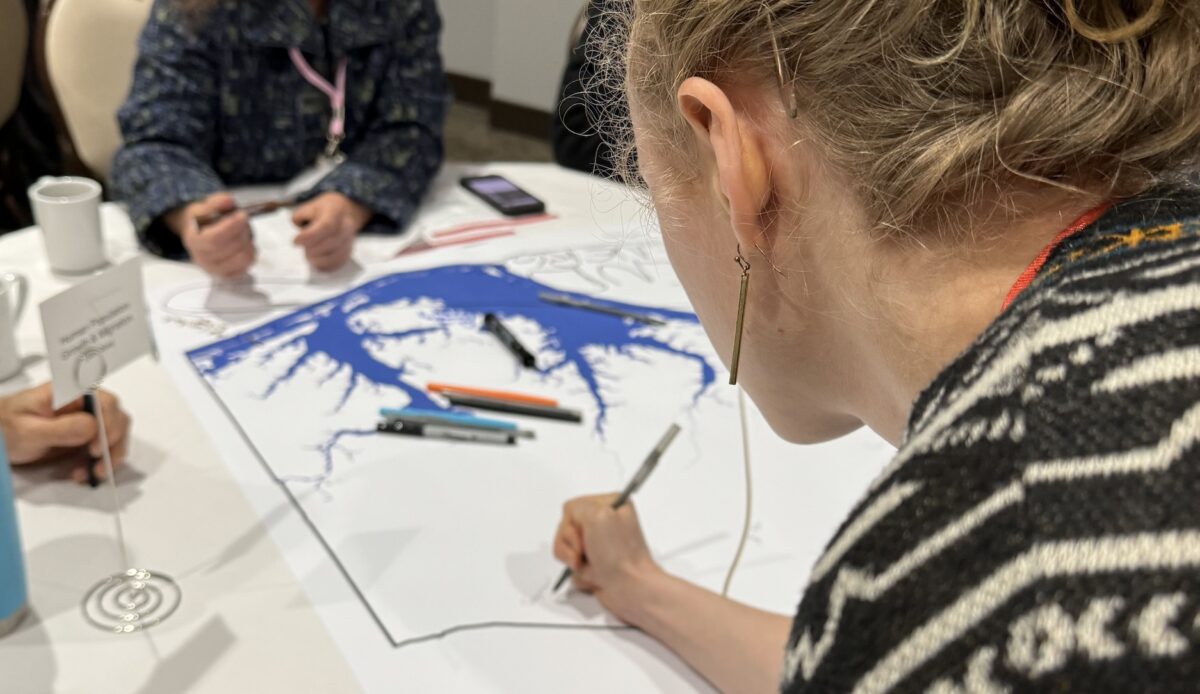Envisioning Transformations in North Carolina’s Coastal Plain

On April 24, the Coastal Resilience and Sustainability Initiative (CRSI) hosted a climate futures workshop for NC State faculty, staff and students, along with external partners from NGOs and state and federal agencies. The goal of the 100-person event was to envision how climate change projections may transform the landscape of North Carolina’s coastal plain and consider the research, engagement, education, and policy opportunities needed to enable a just and sustainable future. The workshop used participatory mapping and a novel gamification approach to meet the goal.
The workshop began with keynote talks from two authors of the Fifth National Climate Assessment: North Carolina State Climatologist Kathie Dello and U.S. Geological Survey, Southeast Climate Adaptation Science Center Research Ecologist Adam Terando. Next, 10 leaders provided three-minute presentations on topics critical for considering transformations in the coastal plain:
- Agriculture: Ekrem Ozlu (NC State College of Agriculture and Life Sciences)
- Energy: Christopher Galik (NC State College of Humanities and Social Sciences)
- Forestry and Habitat: Katie Martin (NC State Department of Forestry and Environmental Resources)
- Government and Policy: Marlena Byrne (NC Office of Recovery and Resiliency)
- Human Population Growth and Migration: Georgina Sanchez (NC State Center for Geospatial Analytics)
- Economic and Workforce Development: Tom White (NC State Economic Development Partnership)
- Military Installations and Training: Chris Baillie (NC Coastal Federation)
- Transportation: Tim Brock (NC State Institute for Transportation Research and Education)
- Water and Water Infrastructure: Mike Burchell (NC State College of Agriculture and Life Sciences)
- Wetland Migration: Justine Neville (U.S. Geological Survey).

These lightning talks provided all workshop attendees with three key messages about each topic, and then attendees were assigned to one of these topics to learn more about it and discuss how the topic intersects with their area of expertise. This baseline knowledge allowed for interdisciplinarity to occur during the next activity, an asset mapping exercise in which someone from each topic table joined a new table. This mapping exercise prepared attendees for the next activity, an envisioning transformations game called FutureScape.
FutureScape was designed to challenge participants to work together as an interdisciplinary team to envision future transformation pathways for the coastal plain. Participants delve into a captivating journey from the present to the distant future, navigating a terrain of uncertainty and opportunity. Guided by the U.S. Department of the Interior’s Resist-Accept-Direct (RAD) framework, players grapple with the urgent realities of climate change and its impacts on coastal communities. Each turn, representing a decade, demands swift yet strategic decisions amidst the unpredictable forces of nature, from droughts to floods to hurricanes. With only 10 minutes per turn to collectively strategize, every choice shapes the region’s destiny. FutureScape isn’t merely a game; it’s a catalyst for collaboration, foresight, and actionable insights into climate change adaptation and resilience planning.
This gamification approach set the stage for deep discussions about critical decision points and what research, education, engagement and policy needs and opportunities to support better decisions and enable just and sustainable transformations in the coastal plain. There is a lot of work ahead for NC State and its university partners to help inform future decisions about value-based trade-offs facing the region’s communities and landscape. NC State and the CRSI are excited about the next iterations of FutureScape and bringing it to classrooms, communities and other regions!
CRSI is particularly grateful to the faculty, staff and students (with representation from all 10 colleges), external partners (state and federal agencies, RTI and NGOs), lead facilitator Michelle Covi (Georgia Sea Grant) and the 10 table facilitators (listed below), FutureScape designers and the amazing planning team who collaborated for months to make the event a success. We are also grateful to the deans of NC State’s 10 colleges, as well as the director of NC State Extension, for submitting workshop participant nominations. Funding for this workshop was provided by the Office of University Interdisciplinary Programs. The collaborative spirit embodied in the planning and execution of this event demonstrates how CRSI effectively harnessed the power of the Climate Solutions Collaborative.
Planning team members and FutureScape designers* included:
NC State University
- Erin Seekamp (Coastal Resilience and Sustainability Initiative)
- Rebecca Ward* (Coastal Resilience and Sustainability Initiative)
- Kelsey Hart (Coastal Resilience and Sustainability Initiative)
- Georgina Sanchez* (Center for Geospatial Analytics)
- Emma Butzler* (Center for Geospatial Analytics)
- Kathie Dello (North Carolina State Climate Office)
- Adam Terando (Southeast Climate Adaptation Science Center)
- Michelle Jewell (Southeast Climate Adaptation Science Center)
NC Sea Grant
- Susan White
- Frank Lopez
- Cayla Cothron*
Environmental Defense Fund
- Michelle Lovejoy
NC Museum of Life + Science
- Max Cawley.*
Table facilitators included:
- Stacey Feken (Albemarle-Pamlico National Estuary Partnership)
- Cirse Gonzalez (Chesapeake Bay National Estuarine Research Reserve)
- Sarah Latshaw (National Oceanic and Atmospheric Administration)
- Hilary Morris (U.S. Fish & Wildlife Service | Southeast Conservation Adaptation Strategy)
- Christy Perrin (NC Sea Grant)
- Darcie Roten (Cape Fear Museum)
- Addie Thornton (Southeast Regional Partnership for Planning and Sustainability)
- Amy Thornton (Cape Fear Museum)
- Louise Vaughn (U.S. Fish & Wildlife Service | Southeast Conservation Adaptation Strategy)
- Imani Vincent (NC Museum of Life + Science).
- Categories: